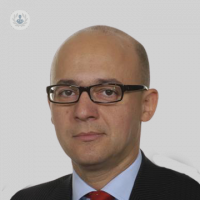Do you have a goitre? Symptoms, diagnosis and treatment
Escrito por:A goitre is a swelling in the neck that happens due to an enlarged thyroid gland. Mr Radu Mihai (a general and endocrine surgeon) explains the causes of this, the symptoms and the treatment options you may be provided.

What is a goitre?
The term goitre (also spelt goiter) describes a bilateral enlargement of the thyroid gland. This can be either symmetrical (i.e. similar enlargement of both lobes of the thyroid gland) or unilateral (i.e. one of the lobes being much larger than the other one).
What causes a goitre?
There are several potential causes of goitre:
Low iodine
The most convincing relation is between low iodine content and the high incidence of goitre in some geographical areas ( endemic goitre). In parts of the world with high altitude mountains, the soil contains a minimal amount of iodine and the lack of iodine in the diet of the local population leads to a high incidence of goitre. In such areas, oral daily iodine supplements (e.g. use of iodinated salt) reduce the incidence of goitre. Iodine deficiency may be made worse by a diet high in hormone-inhibiting foods, such as cabbage, broccoli and cauliflower.
There are increasing concerns that the iodine content in the diet of Western populations is lower than normal and the arguments of whether or not to introduce regular iodine supplements are relevant in many countries
Graves’ disease
In Graves’ disease, the goitre is caused by an enlargement of the thyroid gland due to stimulation from the autoantibodies that bind to specific proteins present in the wall of thyroid cells. Such autoantibodies bind to the TSH receptor, stimulate the function of the thyroid (hence the development of hyperthyroidism, i.e. overactive thyroid gland) and lead to an enlargement of the gland.
Hashimoto thyroiditis
In Hashimoto thyroiditis, the thyroid gland is ‘attacked’ by cells of the immune system. Infiltration of the gland with such cell s initially leads to an increase in the overall volume of the gland (i.e. a clinically apparent goitre). In time, the glad is destroyed by this autoimmune process and the volume of the gland decreases.
For the vast majority of patients with goitres, no exact cause can be easily demonstrated as they present with numerous nodules of different sizes spread throughout both lobes (a condition called multinodular goitre).
Thyroid cancer usually presents with a unilateral thyroid nodule rather than a bilateral involvement of the thyroid but many patients with goitres are concerned that the neck swelling could be cancerous.
What symptoms are there?
Whether the presence of a visible neck fullness/mass/swelling raises cosmetic concerns is a matter of personal views.
A large goitre can create local compressive symptoms through pressure on the trachea (windpipe) or oesophagus (gullet). This can lead to breathing problems such as shortness of breath on exertion, noisy breathing (stridor) or difficulties breathing when lying flat in bed and needing an increasing number of pillows for support. Hoarseness of voice can be apparent in some patients. Swallowing of solid or dry foods can be difficult (dysphagia) if the oesophagus is compressed and/or deviated.
When is it time to see a doctor for goitre symptoms?
Small asymptomatic goitres in patients who feel well are of no clinical concerns. A referral should be made if patients report symptoms related to the goitre (as described above) or if the size of the goitre is significant.
During the appointment, the doctor will:
- Take clinical history.
- Examine the patient.
- Organise blood tests (to check thyroid function and the measure level of antithyroid autoantibodies).
- Organise an ultrasound scan of the thyroid. If the scan identifies nodules with suspicious appearance, a needle biopsy of the nodule(s) will be done.
What treatment is there for a goitre?
If blood tests demonstrate any evidence or under- or overactive thyroid function, appropriate medication is prescribed to normalise the levels of thyroid hormones. This is done either by administering thyroid hormones (thyroxine) or blocking the thyroid function using carbimazole/propylthiouracil.
The majority of patients have normal thyroid function tests and therefore medication is not needed.
Thyroid surgery is commonly indicated to patients with compressive symptoms and is critical in patients with thyroid cancer.
The following non-operative treatments are very rarely used:
- Radioactive iodine ablation is used in patients with Grave’s disease but has limited efficacy in multinodular goitres.
- High-intensity focused ultrasound and radiofrequency ablation use physical energy to create high temperature within the thyroid with the expected destruction of part of the thyroid.
Can the condition reoccur after treatment?
After thyroid surgery, there is no possibility of the goitre recurring on the side of the neck operated. Subtotal thyroidectomy has been abandoned in surgical practice since the late 1980s, therefore, there should be no thyroid tissue left on the side of the neck operated. Whether one lobe of the thyroid (hemithyroidectomy, thyroid lobectomy) or total thyroidectomy is the right surgery for you will be discussed with the surgical team in charge of your care.
Discover how Mr Mihai’s surgical expertise can help you – visit his profile.


